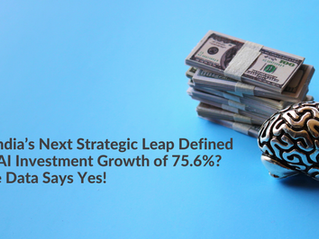Is AI the Key to Smarter Tech Marketing and Customer Segmentation?
- AgileIntel Editorial

- Oct 21, 2025
- 4 min read

In the dynamic realm of technology marketing, effectively reaching the right customer with the appropriate message at the right moment is crucial. Traditional segmentation methods often struggle to capture the complexities of customer behaviour. This is where Artificial Intelligence (AI) comes into play, revolutionising how tech companies comprehend and engage their audiences. By analysing extensive data sets, AI facilitates hyper-personalised marketing strategies that yield significant business results.
AI also empowers marketers to anticipate trends and respond more swiftly than ever. With AI, companies can identify emerging customer needs, foresee churn, and optimise real-time campaigns. Internal industry observations indicate that firms employing AI-driven segmentation and predictive analytics report engagement rates that are 25–30% higher, alongside a 20% increase in conversions compared to campaigns using traditional methods.
AI-Driven Customer Segmentation: Advancing Beyond Traditional Methods
Customer segmentation has progressed from basic demographic categories to more nuanced behavioural and psychographic profiles. AI enables marketers to analyse data from various touchpoints, such as website interactions, purchase histories, and social media activity, to identify patterns and accurately segment customers.
For example, Myntra, a leading Indian fashion e-commerce platform, adopted AI-driven segmentation to classify customers into High Spenders, Moderate Shoppers, and Price-Sensitive Shoppers. By customising marketing strategies for each segment, Myntra improved customer engagement and retention, resulting in a 25% revenue increase for the year ending March 31, 2025.
Predictive Personalisation in Campaigns
AI goes beyond merely segmenting customers; it predicts their future behaviours and preferences. This predictive capability allows marketers to deliver personalised content and offers that resonate with individual customers.
Netflix exemplifies this strategy through its recommendation engine, which utilises AI algorithms to analyse viewing history and suggest content tailored to each user. This personalised approach has been key in maintaining user engagement and reducing churn.
Similarly, a major smartphone brand leveraged AI to personalise email campaigns. The company analysed customer data and identified which customers would most likely respond to trade-in offers versus new product promotions. This targeted strategy led to a 28% increase in click-through rates and a 22% rise in conversions.
Enhancing Marketing Efficiency with AI
AI streamlines marketing operations by automating routine tasks and providing real-time insights into campaign performance. This efficiency allows marketing teams to concentrate on strategic initiatives that drive growth.
For instance, a consumer electronics company utilised AI during a product launch to analyse social media sentiment. By identifying both advocates and detractors, the company customised its messaging, converting 15% of detractors into loyal customers and enhancing positive sentiment, which resulted in a 12% increase in product pre-orders.
Success Stories: AI in Action
Beyond Myntra and Netflix, numerous companies have harnessed AI to transform marketing and customer segmentation:
Amazon employs AI to optimise product recommendations. Their AI-driven recommendation engine accounts for approximately 35% of total revenue, analysing purchase history, browsing patterns, and real-time engagement. Personalised suggestions also encourage higher repeat purchases.
Flipkart, another leading Indian e-commerce platform, uses AI to predict customer preferences based on past transactions and search behaviour. During the Big Billion Days sale, AI-driven targeting increased conversion rates for high-intent buyers by 30%.
Sephora, the global cosmetics retailer, integrates AI to personalise online and in-store customer interactions. Their AI-powered chat assistant and product recommendation tool increased online conversion rates by 15% and enhanced customer retention through hyper-personalised skincare and makeup suggestions.
Spotify leverages AI to curate playlists for individual users based on listening history and engagement metrics. AI-generated playlists like “Discover Weekly” and “Daily Mix” have significantly boosted user engagement, contributing to Spotify’s global subscriber growth.
These examples demonstrate that AI can significantly impact revenue and customer satisfaction by enabling precise targeting and tailored experiences.
AgileIntel Perspective: Harnessing AI for Strategic Growth
From our experience, companies incorporating AI into their marketing strategies observe measurable improvements in customer engagement and business performance. AI allows marketers to shift from reactive to proactive strategies, anticipating customer needs and delivering personalised experiences at scale.
However, successful AI implementation requires more than just technology. It necessitates a strategic approach that aligns AI initiatives with business objectives, continuous data analysis, and a commitment to customer-centricity.
Challenges and Considerations
While AI offers substantial advantages, it also presents challenges. Data quality is vital, as inaccurate or biased data can lead to misguided insights. Additionally, marketers must navigate privacy concerns and regulatory requirements to maintain customer trust.
Transparency in AI decision-making processes is crucial. Customers are more likely to engage with brands that are open about how their data is used and how AI influences the content and offers they receive.
The Future of AI in Tech Marketing
The potential of AI in marketing is vast and continually evolving. Emerging technologies such as generative AI and advanced predictive analytics promise to further enhance personalisation and customer engagement.
For example, AI-powered chatbots are becoming increasingly sophisticated, providing real-time customer support and personalised recommendations. As these technologies advance, they will play an even more integral role in shaping the future of tech marketing.
Conclusion: Turning Intelligence into Influence with AI
AI has transitioned from being a supportive tool for marketing to becoming the central force shaping customer experiences, business strategies, and competitive advantage. Companies that effectively harness AI do not merely react to customer behaviour; they anticipate it, influence it, and create meaningful, personalised journeys that drive loyalty and growth.
In a market where consumer attention is fleeting and competition intensifies daily, the question is no longer whether to adopt AI, but how strategically organisations can embed it across their marketing, product, and customer engagement strategies. Those who succeed will not only capture market share but also redefine the standards of customer experience in the technology sector.







Comments